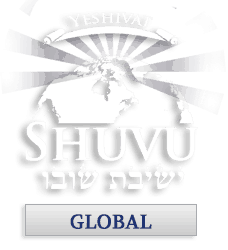וַיְדַבֵּ֥ר יְהֹוָ֖ה אֶל־משֶׁ֥ה לֵּאמֹֽר: דַּבֵּ֛ר אֶל־בְּנֵ֥י יִשְׂרָאֵ֖ל לֵאמֹ֑ר אִ֣ישׁ אִ֣ישׁ כִּי־יִֽהְיֶ֥ה טָמֵ֣א | לָנֶ֡פֶשׁ אוֹ֩ בְדֶ֨רֶךְ רְחֹקָ֜ה֗ לָכֶ֗ם א֚וֹ לְדֹרֹ֣תֵיכֶ֔ם וְעָ֥שָׂה פֶ֖סַח לַֽיהֹוָֽה: בַּחֹ֨דֶשׁ הַשֵּׁנִ֜י בְּאַרְבָּעָ֨ה עָשָׂ֥ר י֛וֹם בֵּ֥ין הָֽעַרְבַּ֖יִם יַֽעֲשׂ֣וּ אֹת֑וֹ עַל־מַצּ֥וֹת וּמְרֹרִ֖ים יֹֽאכְלֻֽהוּ: לֹֽא־יַשְׁאִ֤ירוּ מִמֶּ֨נּוּ֙ עַד־בֹּ֔קֶר וְעֶ֖צֶם לֹ֣א יִשְׁבְּרוּ־ב֑וֹ כְּכָל־חֻקַּ֥ת הַפֶּ֖סַח יַֽעֲשׂ֥וּ אֹתֽוֹ: וְהָאִישׁ֩ אֲשֶׁר־ה֨וּא טָה֜וֹר וּבְדֶ֣רֶךְ לֹֽא־הָיָ֗ה וְחָדַל֙ לַֽעֲשׂ֣וֹת הַפֶּ֔סַח וְנִכְרְתָ֛ה הַנֶּ֥פֶשׁ הַהִ֖וא מֵֽעַמֶּ֑יהָ כִּ֣י | קָרְבַּ֣ן יְהֹוָ֗ה לֹ֤א הִקְרִיב֙ בְּמֹ֣עֲד֔וֹ חֶטְא֥וֹ יִשָּׂ֖א הָאִ֥ישׁ הַהֽוּא:
The Lord spoke to Moses saying: Speak to the children of Israel saying, Any person who becomes unclean from [contact with] the dead, or is on a distant journey, whether among you or in future generations, he shall make a Passover sacrifice for the Lord. In the second month, on the fourteenth day, in the afternoon, they shall make it; they shall eat it with unleavened cakes and bitter herbs. They shall not leave over anything from it until the next morning, and they shall not break any of its bones. They shall make it in accordance with all the statutes connected with the Passover sacrifice. But the man who was ritually clean and was not on a journey, yet refrained from making the Passover sacrifice, his soul shall be cut off from his people, for he did not bring the offering of the Lord in its appointed time; that person shall bear his sin.
Numbers 9:9-13
This week’s Torah portion contains the mitzvah of Pesach sheni, the Second Pesach. The mitzvah is simple to understand, if on Pesach, the 14th of Nisan, one is ritually contaminated from having touched a dead body, one cannot partake in the eating of the Korban Pesach. So, Hashem makes provision for those who were contaminated, and those who are too far away. By allowing the Korban Pesach to be made one month later, on the 14th of Iyar.
The mitzvah seems easy enough, and it is frequently taught that the purpose of the mitzvah is to show that Hashem gives us second chances. This interpretation, however, raises some very serious questions. If the purpose of this mitzvah is to teach us that Hashem gives second chances, why do we have a Second Pesach, but no Second Shavuot or Second Sukkot? Why is it that the Chagiga, the Festival offering, is commanded for Pesach, but not Second Pesach? Even though we have a second chance for Pesach (but not for the Chagiga Pesach offering), we do not have a second chance for Succot, and we do not have a second chance for Shavuot. So is this mitzvah really about second chances at all?
In fact, Pesach Sheni is more about the importance of Israel being reminded about the original Exodus from Egypt than it is about second chances. The reality is that we may celebrate Shavuot, and we may celebrate Sukkot, only because of the Pesach. Israel must be reminded of the story of the Exodus from Egypt. We are reminded to relate the story in Torah. Because of the commandment “when your children ask,” we relate the story. With the offering of the Bikkurim, we relate the story. When we make kiddush on Shabbat we say, “in remembrance of the Exodus from Egypt.” We thank Hashem for the Torah given at Sinai; we thank Hashem for the joyous celebration of Sukkot. But, we are not commanded to relate the stories of these festivals. But we are commanded to do so for Pesach. It is that important to keep in the forefront of our minds. Therefore, Hashem gives a specific few the ability to bring the Karbon Pesach if they were contaminated or too far away on the 14th of Nisan. Shabbat shalom.
